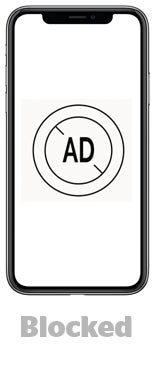Here’s today’s AdExchanger.com news round-up… Want it by email? Sign up here.
Out Of The Blocks
Mobile ad blocking is on the rise. More than 527 million people around the world have an ad blocker installed on their mobile devices, up 64% since 2016, according to a report from PageFair and Blockthrough. In the United States, where mobile represents 70% of digital ad spend, mobile ad blocking is up from 1% in 2016 to 2% in 2019, and is expected to reach 6% by 2022. People who use mobile ad blockers also tend to consume more media than those who don’t block ads, according to Marty Krátký-Katz, Blockthrough’s co-founder and CEO. The major browsers have default ad blockers, excluding Google Chrome, which is “handcuffed when it comes to blockers for their mobile browser,” Krátký-Katz told AdAge. “They’ve done what they can to improve ads through things like AMP, but ad blocking on mobile is somewhere they can’t really go.” Publishers have been able to mitigate ad blocking through the Acceptable Ads program. The irony is that to do so they pay Eyeo, which owns Adblock Plus. More.
Better Ads
Speaking of Chrome’s default ad-blocker features, starting in August the browser will disable some ad units for videos that are less than eight seconds long. These include ads or groups of ads that are longer than 31 seconds and cannot be skipped within the first five seconds, midroll ads of any length and image or text ads that cover more than 20% of a video. The standards are based on research from 45,000 consumers around the world by the Coalition for Better Ads, a Google-backed group that certifies publisher ad units. “It’s important to note that YouTube.com, like other websites with video content, will be reviewed for compliance with the Standards,” writes Google product manager Jason James. Read the blog post.
Travel Rewards
BuzzFeed is launching a new travel industry affiliate marketing and measurement program that it hopes will increase its revenue from hotel and hospitality marketers. BringMe, BuzzFeed’s travel vertical, is piloting the new sponsored content offering with Hilton, including site and social content created by BuzzFeed and a paid media campaign, Digiday reports. The tricky part is that flight and hotel bookings tend to be long, considered purchases. People don’t immediately transact via an affiliate link in the way ecommerce media networks typically earn commissions. Hilton’s deal with BringMe will use view-through attribution to credit BringMe for sales. “The feeling with BringMe was always we’re driving a lot [of activity], but we’re not getting much credit for it,” said BuzzFeed CEO Jonah Peretti. “We felt that if we could take advantage of it, and have a partner that has accommodations globally, then we could start to connect the dots.” More.
But Wait, There’s More
- EU Deepens Antitrust Inquiry Into Facebook’s Data Practices – WSJ
- New Test For Snap Vet: Prove Quibi Doubters Wrong – Protocol
- Optimove Acquires Real-Time Event Data Company Axonite – release
- Why Some DTC Brands Are Exiting Amazon – Modern Retail
- Should Google Shrink To Save Itself? – NYT
- Programmatic Advertising Is Driving Rapid Growth In Mobile Video – eMarketer
- ‘Peleton Wife’ Helped Spur Holiday Sales For The Fitness Brand – Ad Age
- Forrester: Marketers, Doing Nothing Isn’t An Option On Data Restrictions – blog
- Amazon Considered Selling Streaming Tech Behind Twitch – The Information
- Radio’s Digital Ad Revenue Surpasses $1 Billion Threshold – Radio + TV Business Report
You’re Hired
- Apple’s News Service Business Chief Departs After Slow Start – Bloomberg
- Forbes Elevates Lynn Schlesinger To Chief Marketing Officer – Forbes
- Eric Bosco Named Chief Product Officer At Nielsen Global Media – release










